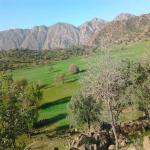کوهمره کاکایل خوش اندی
یادباد آبادي سرسبز ایل/ مردمان خوب و یكرنگ و اصیل/نان و دوغ و پونه و كشك و كره/ آغل بزغاله و میش و بره/ كاش برميگشت دوباره مشك دوغ/خسته ايم از دوره رنگ و دروغ!
Information about the Ghashghai (Qashqai) Nomads The Qashqa'i (pronounced Gosh-guy-ee) nomads of Iran are Turkic-speaking shepherds. They live in the harsh deserts of the Zagros mountains of Fars province in southwestern Iran. Some Qashqa'i can be found in the cities of Shiraz, Firuzabad, Kazerun, Farrashband, Equlidabad, Abadeh and Semiron. This people group has been extremely isolated with their twice annual migration 200-350 miles from summer to winter pastures. As they pass near Shiraz, the major city in southwest Iran, there is exposure to other cultures. Shiraz has also become the center of Qashqa'i political and economic affairs. Shiraz lies between the summer and winter pastures, which lie south and north of the city, and most Qashqa'i migrate past the city twice annually. Many Qashqa'i have moved from Iran and have been identified in the USA, England, Germany, Canada, India, The Netherlands, Norway, Sweden, Austria and the United Arab Emirates.
نظرات شما عزیزان:
![]()
![]()
Qashqai HISTORY
The Qashqa'i began entering Iran from central Asia in the 11th century AD. Little information is available on the Qashqa'i until the mid-18th century when Karim Khan Zand, ruler of the southern part of Iran, appointed a Qashqa'i as tribal leader of a province. The Qashqa'i name means "those of a horse with a white-starred forehead" or "those who fled."
QASHQAI IDENTITY
The Qashqa'i remain a separate people and are one of many minority groups in Iran. The tribes have diverse linguistic and cultural roots but refer to themselves as "Turks." The 1998 Ethnologue estimates their current population to be 1.5 million. There are 5 large tribes that make up the Qashqa'i federation (Amaleh, Darrehshuri, Kashkuli-Bozorg, Farsi Madan & Shish Boluki). Each tribe consists of a number of named subgroups (taifeh), which are represented by headmen and have their own traditional areas of winter and summer pastures. Alternate spellings are Kashkai, Kashgai, Ghashgai, Ghashghai, Ghashghaie, Qashqay or Qashqai.
QASHQAI LANGUAGE
The Qashqa'i language, which is unwritten, is linguistically similar to Azeri (Azerbaijani). Most of the Qashqa'i can communicate in Farsi which is the national language of Iran. The Qashqa'i call their language "Turki."
QASHQAI POLITICAL SITUATION
There have been many efforts by the Iranian government to limit the nomadic life-style of the Qashqa'i. Many have settled and no longer migrate, but many of the people still are nomads and remain isolated away from civilization.
QASHAI CUSTOMS
The Qashqa'i nomadic way of life is supported primarily by the raising of sheep and goats. The wool from the sheep is sold annually and the extra cheese, curds and dairy products also provide a source of income. Camels and donkeys are being replaced more and more by trucks to carry the tents and other gear during migration. Crops such as barley and wheat are raised to provide additional food for the people and the herds.
The women are talented weavers and produce distinctive rugs both for their own use and to sell. These carpets are used to decorate the rectangular black Qashqa'i tents. The women wear long floral-print dresses and cover their heads with colorful scarves that let some hair show. In Iranian cities, the Qashqa'i women dress like other women but show their bright dresses a few inches below the black chador. Qashqa’i marriages, which link the camps and herding groups together, are arranged by the women. Qashqa'i men make the decisions regarding migration and business transactions. Some of the men still wear the traditional Qashqa'i gray felt two-eared hats. The men are good horsemen and marksmen. Qashqa'i children are taught in Farsi by teachers who live and travel with the families.
QASHQAI RELIGION
Almost all Qashqa'i are Shia Muslims. In national political struggles, the leaders have been allies of the Muslim clergy in Shiraz, Tehran and Najaf (Iraq). They do follow Muslim traditions during the rites of marriage, death and sacrifice animals on occasion. Very few Qashqa'i observe daily prayers, however, and do not fast during Ramadan, the month of fasting by Muslims.
برچسبها: قشقایی
